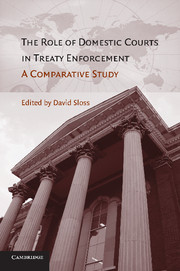Book contents
- Frontmatter
- Contents
- Contributors
- Preface
- Acknowledgments
- 1 Treaty Enforcement in Domestic Courts: A Comparative Analysis
- 2 Does International Law Obligate States to Open Their National Courts to Persons for the Invocation of Treaty Norms That Protect or Benefit Persons?
- 3 Australia
- 4 Canada
- 5 Germany
- 6 India
- 7 Israel
- 8 The Netherlands
- 9 Poland
- 10 Russian Federation
- 11 South Africa
- 12 United Kingdom
- 13 United States
- 14 The Role of Domestic Courts in Treaty Enforcement: Summary and Conclusions
- Index
- References
14 - The Role of Domestic Courts in Treaty Enforcement: Summary and Conclusions
Published online by Cambridge University Press: 06 January 2010
- Frontmatter
- Contents
- Contributors
- Preface
- Acknowledgments
- 1 Treaty Enforcement in Domestic Courts: A Comparative Analysis
- 2 Does International Law Obligate States to Open Their National Courts to Persons for the Invocation of Treaty Norms That Protect or Benefit Persons?
- 3 Australia
- 4 Canada
- 5 Germany
- 6 India
- 7 Israel
- 8 The Netherlands
- 9 Poland
- 10 Russian Federation
- 11 South Africa
- 12 United Kingdom
- 13 United States
- 14 The Role of Domestic Courts in Treaty Enforcement: Summary and Conclusions
- Index
- References
Summary
INTRODUCTION
The legal world at the dawn of the twenty-first century finds itself in a period of profound, and for some, unsettling, transition. It is of course a truism that one of the most enduring features of the law – as a system designed to regulate constantly inventive and adaptive human systems – is change. But certain transformations are of a more seismic nature. As international law continues to expand in both depth and breadth, the consequent friction over its penetration into domestic law portends one such fundamental shift in the modern legal world. Perhaps no better fact highlights the significance of this tension than the existence of more than fifty-five thousand formal treaties worldwide (and nearly triple that number of derivative acts of international law significance).
The foundation (or significant expansion) of any autonomous system of laws inevitably creates tension with the legal orders that abut or precede it. In this sense, the increasing friction between international and municipal law is not a novel phenomenon. For example, as new nation-states coalesced in nineteenth-century Europe and South America, of necessity the drafters of the new civil codes had to address the continued vitality of the preexisting statutory and customary norms. The issue was perhaps even more immediate for twentieth-century legal architects in newly reconstituted, yet broadly multicultural states such as Russia and China. But similar challenges in resolving the friction between new and old arose as well for the numerous postcolonial legal orders founded throughout the twentieth century.
- Type
- Chapter
- Information
- The Role of Domestic Courts in Treaty EnforcementA Comparative Study, pp. 555 - 614Publisher: Cambridge University PressPrint publication year: 2009
References
- 3
- Cited by



